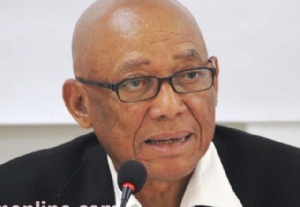General News of Monday, 19 September 2016
Source: classfmonline.com
Gov't’s fight against graft not enough – Emile Short
The former Commissioner for the Commission on Human Rights and Administrative Justice (CHRAJ), Justice Emile Short has shot down government’s claim that it has done enough to fight corruption.
President John Dramani Mahama at the 2016 manifesto launch of the governing National Democratic Congress (NDC) said his government in the last four years had been candid and transparent with the people of Ghana and applied “the most potent disinfectant in fighting corruption – exposure”.
Mr Mahama said “we will investigate corruption wherever we find it” and that the government would continue to make corruption a “high-risk crime” adding that the NDC government’s enviable record in the battle against corruption was corroborated by Transparency International’s corruption perception index, which Mr Mahama described as the most credible corruption index.
However, speaking with Regina Borley Bortey on 12Live on Class91.3FM on Monday 19 September, Mr Short said there were many things that could have been done by the NDC to fight corruption but were not done.
“There is a lot of anti-corruption legislation which have not been addressed and it is an important component in the fight against corruption. [For example], the Conduct of Public Officers bill 2013, which is before parliament; it has been before parliament for quite some time. It deals with conflict of interest guidelines as well as gifts. No serious attention has been given to that particular legislation.
“Then you have the Assets Declaration Legal Regime that has also been discussed many times in parliament and noting has been done about it. And if you’re going to fight grand corruption, in other words, corruption at the top, there is the need to have an effective Assets Declaration law which ensures that public officers declare their assets and that some institution or body is empowered to verify the accuracy of these declarations and also to make public the declarations. So that is another piece of legislation which has not been addressed,” Mr Short added.
The former CHRAJ boss went on further to say: “You have the Freedom of Information bill, which has been in parliament for over a decade and has still not been passed and then there is the need to pass legislation to broaden the definition of corruption as is contained in two conventions which Ghana ratified as far back as 2005, namely: The United Nations Convention Against Corruption as well as Africa’s Convention on Fighting Corruption. These are important pieces of anti-corruption legislation which have not been given necessary attention”.
According to him, people found culpable in the Auditor General’s report have over the years not been prosecuted to serve as a deterrent; therefore, government cannot claim to have done a lot to fight corruption.
“Also, we have the Auditor General’s reports, which are presented to the Public Accounts Committee every year and in this report, we see a catalogue of financial irregularities, corruption, embezzlement, breaches of the procurement law and so on and the president had declared some time that the Attorney General takes action for the enforcement of the recommendations of the Auditor General, but as I speak, to my knowledge, nothing has been done to hold anybody accountable for these multiplicity of financial irregularities that are listed in the Auditor General’s report over the years. So I think there is a lot which could have been done that has not been done,” he stressed.
In Mr Short’s opinion, there has not been sufficient public awareness about the causes and evils of corruption and, therefore, advised government to “fund the institutions that are responsible for creating this awareness so they could be able to do this because unless we move to a situation where the public are ready and willing to hold accountable public officers for corruption, then we are not going to go anywhere…”
“The statement that a lot has been done [to fight corruption], I don’t see how the government has been able to address what I have mentioned already”.











